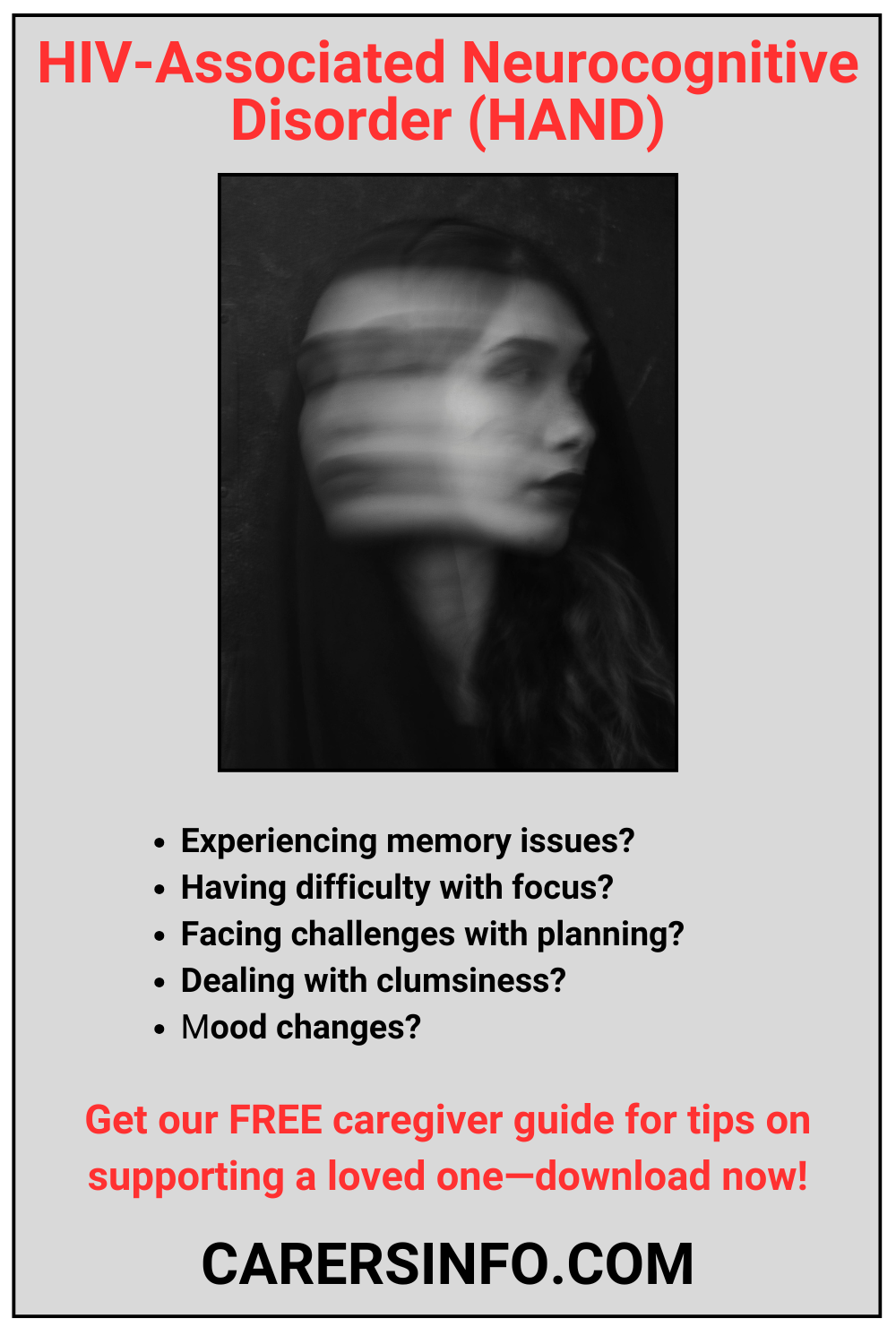 Caring for a loved one is a journey filled with love, dedication, and often, unexpected hurdles. When cognitive changes are part of the picture, the path can become even more complex and emotionally demanding. If you’re supporting someone experiencing HIV-Associated Neurocognitive Disorder (HAND), you’re likely navigating a unique set of challenges that often go unseen and unspoken.
Caring for a loved one is a journey filled with love, dedication, and often, unexpected hurdles. When cognitive changes are part of the picture, the path can become even more complex and emotionally demanding. If you’re supporting someone experiencing HIV-Associated Neurocognitive Disorder (HAND), you’re likely navigating a unique set of challenges that often go unseen and unspoken.
We know that behind every individual diagnosed with HIV-Associated Neurocognitive Disorder (HAND), there’s a dedicated family carer – a partner, child, sibling, or friend – who is the unsung hero. This post is dedicated to you.
Understanding the Landscape of HAND and its Impact on Carers
HIV-Associated Neurocognitive Disorder (HAND) is a condition that affects cognitive function in some individuals living with HIV. It can manifest in various ways, impacting:
- Memory: Forgetfulness, difficulty recalling recent events or names.
- Attention: Struggling to focus, easily distracted.
- Executive Function: Challenges with planning, problem-solving, and organization.
- Motor Skills: Clumsiness, slowed movements.
- Behaviour and Mood: Changes in personality, increased irritability, or apathy.
As a family carer, you witness these changes firsthand. You might be:
- Repeating instructions and explanations.
- Managing increasing daily tasks that your loved one previously handled independently.
- Feeling frustrated by misunderstandings or communication difficulties.
- Worrying about their safety and well-being.
- Experiencing emotional strain as the relationship dynamics shift.
The Power of Empathy: Walking in Your Shoes
It’s crucial to acknowledge the emotional weight you carry. Caring for someone with HIV-Associated Neurocognitive Disorder (HAND) is not just about managing tasks; it’s about navigating a changed relationship and witnessing subtle yet significant shifts in the person you love.
Here’s what we want you to know:
- Your feelings are valid. It’s okay to feel overwhelmed, frustrated, sad, or even angry at times. These emotions are normal responses to a demanding and often heartbreaking situation.
- You are not alone. Many family carers are experiencing similar challenges. Connecting with others who understand can provide immense support and validation.
- Self-care is not selfish; it’s essential. To effectively care for your loved one, you need to care for yourself. Prioritizing your own physical and emotional well-being is crucial for your resilience and long-term ability to provide care.
- Small acts of understanding go a long way. Simple gestures of patience, active listening, and validating their experiences can make a world of difference to your loved one and strengthen your bond.
Practical Steps You Can Take
- Educate yourself further about HAND. Understanding the condition is the first step in navigating its complexities. Reliable resources can provide deeper insights.
- Seek support groups. Connecting with other carers facing similar situations can provide invaluable emotional support, practical advice, and a sense of community.
- Prioritize open communication (even when difficult). While communication might be challenging, strive for patience and understanding in your interactions. Explore non-verbal cues and find ways to connect beyond words.
- Practice self-compassion. Be kind to yourself. Recognize that you are doing your best in a challenging situation and that it’s okay to ask for help and take breaks.
We’re Here to Support You
We are committed to supporting family carers like you. We believe in the power of empathy and understanding to lighten the load you carry.
Ready to take the next step in supporting yourself and your loved one?
Explore Resources:
- Find Support Near You: Connect with local organizations offering carer support groups and resources.
- Join Our Online Community Forum: Share your experiences, ask questions, and find solidarity with fellow carers.
Considering Additional Support?
While medications are not the focus here, supportive services and tools can significantly enhance the quality of life for both the individual with HIV-Associated Neurocognitive Disorder (HAND) and their carer.
- Explore Assistive Technology: Discover tools and technologies designed to aid with memory, organization, and daily tasks, which can ease burdens for both of you.
- Learn About Respite Care Options: Give yourself the gift of a break. Respite care can provide temporary support for your loved one, allowing you to recharge and prevent burnout.
Your empathy, dedication, and care are significant. You are making a difference in the life of your loved one. We acknowledge your efforts and are here to support you throughout this journey.
Your thoughts matter to us—please share your experiences in the comments below! What do you find most helpful as a carer?
